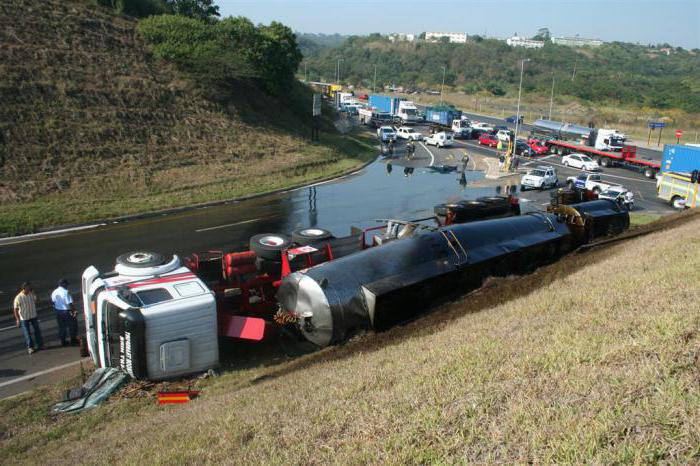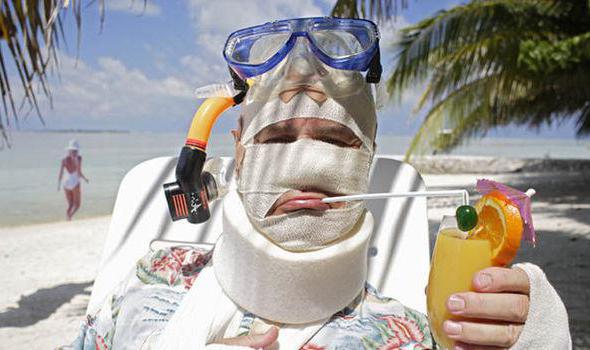Life is so fleeting and unpredictable that, even constantly monitoring the state of your health, you can once wake up in a hospital bed. Accidents do not even “choose” on the basis of whether a person is healthy or not. Therefore, insurance against accidents and diseases is, of course, not a panacea, but a guarantee that the payments received will be enough for treatment.

Terminology
The rules governing insurance, an accident are interpreted as an accident that happened suddenly and against the will of the insured person. As a result of the insured event, temporary incapacity for work or physical injury may occur, in extreme cases - a fatal outcome. The most important thing in this type of insurance is surprise. Therefore, if a person has a chronic disease, which leads to a permanent deterioration in health, and as a result of an accident, an insurance indemnity will never be paid. If the accident was caused by harmful environmental factors or the negative impact of the working conditions where the insured person works, you will also be unable to receive payments.
An accident is an unforeseen and short-term event from external factors. Such a case cannot be the result of a chronic illness or unlawful manipulations of medical personnel that occurred earlier, before the insurance policy was issued. An accident includes medical measures that cause disability, or even cause temporary disability. Poisoning also refers to an accident, it can be gas poisoning or “bad” foods, pharmaceuticals, mushrooms or plants. Insurance may even include household chemical poisoning.
Another of the conditions for paying for insurance is contingency, that is, all factors that lead to a deterioration in health or death should not imply intentional actions by the insured person.

Risks that the insurance policy may cover
Accident and illness insurance is not only assistance after terrorist acts or after poisoning, but also in a situation when:
- loss of full or partial disability, which led to a disability group;
- partial disability, depending on the chosen insurance program;
- fatal outcome due to accident;
- loss of professional ability due to an accident;
- amputation of limbs;
- loss of eye.
The insurance policy may provide for payment even as a result of death for natural reasons.
Insurance policy
The legislator allowed insurance companies to independently determine the rules and conditions for issuing an insurance policy, although with some restrictions. In general, the rules for all companies look approximately the same.
General Provisions
This clause of the rules describes the basis of legal relations between the Policyholder and the Insured. The interpretation of all the terms that were used in the rules, with reference norms to existing regulations is described.
Insurance Objects
Accident and sickness insurance rules clearly define property interests related to harm to health, personal injury or death. It must be specifically indicated to whom the payments will be made in a particular case.

Insurance risks and cases
This paragraph of the document considers events in the event of the occurrence of which an insured event occurs and payments will be made. Cases are described when the Insurer is relieved of the obligation to pay insurance compensation, for example, no payment will be made if death has occurred as a result of self-injury resulting in death. This includes force majeure, the outbreak of a civil war or strike.
Sum insured
The insurance amount is established by agreement of the parties. The premium to the Insurer is calculated from this amount. An increase in insurance compensation, premiums and payments is possible only upon conclusion of an additional agreement, which is signed by both parties to the contract.
This paragraph also provides for possible options for paying the insurance premium, it can be a one-time payment or broken down monthly, quarterly, that is, actually made by installments.
The procedure for concluding an insurance agreement
An accident and illness insurance contract may be concluded for any term, for 2 days or for 1 year or more. The contract can be concluded for a period of a certain event, for example, for the duration of a tourist trip or for the period of departure for the competition.

An insurance contract must be drawn up in writing. The paragraph describes the mandatory clauses that the document must contain, the amount of insurance payments and premiums. The rules must indicate the list of securities that a person intending to purchase an insurance policy must provide to the Insurer. The requirement is also indicated, if there is one, whether the person who decided to buy insurance should undergo a medical examination, and which party will pay for this event. The moment when the insurance contract comes into force is indicated.
The termination of the contract
The rules for accident and illness insurance must necessarily include grounds that may serve as an early termination of the agreement.
This is not only the expiration of the period for which the contract was concluded, but also the non-payment by the insured person of the premium to the insurer, non-fulfillment by the parties of their obligations, liquidation of insurance companies and other grounds.
Reasons for risk changes
The insured person (or beneficiary) is obliged to inform the UK about changes that can dramatically increase insurance payments. If the insured person does not do this, then the Insurance Company has the right to demand termination of the contract at the same time as it becomes aware of such circumstances.
Rights and obligations of the parties
This paragraph of the rules is perhaps the most voluminous, as it describes in detail what each of the parties is entitled to, and which responsibilities. From the moment of checking the provided data by the insured person, until receiving a copy of the insurance policy in case of loss. It is this paragraph that is recommended to be most thoroughly studied in the rules and in the contract by the insured person, so that it is clear what needs to be done in a given situation.
The procedure for insurance payments
This section describes the concept of insurance payment, how payments are made to the insured person. What are the arguments to confirm the occurrence of the insured event, how it must be confirmed, in paper form or by witness or other evidence. The procedure for obtaining insurance payments by heirs or beneficiaries is described.

Final Provisions and Appendices
Accident and health insurance programs may be set out in the final clauses or as separate appendices to the rules. For example, an insurance program for people from 0 years to 70 years, for tourists, athletes or passengers.
The paragraph may include information on the limitation period, and how disputed issues can be resolved.
This is just an example description of insurance rules that are adopted by a particular insurance company on their own, nevertheless be sure to read the accident and illness insurance contract, deal with each item and ask questions to IC specialists if the interpretation of individual items in the rules or in the contract is not clear .
Distinctive features and general features of compulsory and voluntary insurance
Compulsory accident and illness insurance is an integral part of the state program in our country. Such a policy allows the insured person to count on receiving medical care, receiving medicines, but within the framework provided by applicable law. Simply put, to do plastic surgery for compulsory insurance does not work.
In turn, voluntary insurance allows you to maximize the list of medical services that the insured person can count on.
Distinctive features
To understand how these types of insurance differ, you can look at the table below.
Voluntary insurance | Compulsory insurance |
The insurance policy is purchased exclusively at the request of the person who wants to insure himself | Provided by applicable law and is part of the social protection of citizens |
An opportunity to receive additional services not included in the services provided for by the state | Minimum medical care |
Payment is stipulated in the contract and depends on the number of risks covered, made from the funds of the Insured | Insurance premiums are paid at the expense of taxpayers, that is, it is free |
The insured person has the right to independently choose the institution where it will be served | The choice of a medical institution is made by the SC independently |
The first thing that unites voluntary and compulsory insurance is the contractual basis between the parties.
Bank requirements for an insurance policy
Very often, applying to a bank for a loan, especially for a large amount, a potential borrower finds out that he still needs to be insured. Insurance of borrowers against accidents and illnesses is an additional guarantee for the bank that, if something happens to the person, the outstanding amount of the debt will nevertheless be repaid.
Under the insurance risks usually fall the death of the borrower, long-term disability and others.
A bank issuing a loan can determine the circle of insurance companies in which it is possible to conclude a contract for life insurance against accidents and illnesses. When choosing a policy, try to cover not only the main amount of the debt, but also be able to provide additional financial assistance to relatives. This kind of service is quite expensive, therefore it is better to stipulate the maximum number of risks in the contract.

Interesting current insurance programs
VTB accident and illness insurance offers the following.
“Excellent protection // Family” is a program that covers the risks associated with accidents and is designed for the whole family. Adult family members from 18 to 55 years can insure, children are insured from 3 to 17 years. One policy may include insurance for 2 parents and 3 children at once. The main risks:
- injury due to accidents or after playing sports;
- disability;
- care for the injured insured person.
The main convenience of this program is that all family members can be insured at the same time.
For a stay outside the borders of the country, VTB also offers interesting programs.Voluntary insurance against accidents and diseases from VTB applies to most countries of the world, including the former Soviet republics. Insurance will also be valid in transit countries. As a rule, travelers want to insure themselves in case of an unforeseen illness, or if they need to see a dentist. It is recommended that the policy include services not only for emergency care, but also full hospitalization, transportation and repatriation.

Company "Sogaz"
The company provides accident and health insurance. Sogaz is perhaps the most popular company and has gained certain trust among our citizens. According to statistics, every 10 citizens of our country are insured here.
The company offers a huge range of insurance products: from compulsory health insurance to the sale of voluntary insurance policies and other products. Sogaz simply and clearly builds relationships with its customers, the procedure for obtaining reimbursement is as simple as possible.